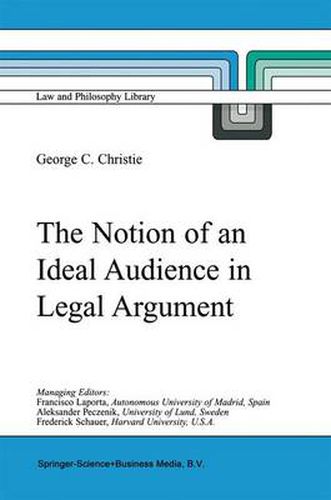Readings Newsletter
Become a Readings Member to make your shopping experience even easier.
Sign in or sign up for free!
You’re not far away from qualifying for FREE standard shipping within Australia
You’ve qualified for FREE standard shipping within Australia
The cart is loading…






This title is printed to order. This book may have been self-published. If so, we cannot guarantee the quality of the content. In the main most books will have gone through the editing process however some may not. We therefore suggest that you be aware of this before ordering this book. If in doubt check either the author or publisher’s details as we are unable to accept any returns unless they are faulty. Please contact us if you have any questions.
This book examines in some detail how our concepts of an ideal or ‘universal’ audience influence legal argument. It shows how asking what are the arguments and the forms of argumentation that we believe would be accepted by such an audience, is a useful analytical tool. The book explores what, if any, are the constraints that our vision of an ideal audience imposes on public discourse and particularly on legal discourse. Some visions of a universal audience are widely shared; others are only shared within particular political and legal cultures. Stylistic preferences can have as important an influence on legal decision making as do substantive preferences. In some cultures and legal systems there is a preference to resort to broad general principles; in others there is a preference for a more circumscribed and particular mode of legal argument. Different legal cultures have different idealized notions as to the role of the judge. Different conceptions of the role of the judge will influence many aspects of legal decision making, including how statutes and other authoritative official instruments should be interpreted. All these issues will also be influenced by how a particular legal culture envisions the common or public good and by how tolerant a particular legal culture is of diverse outcomes, that is by how much discretion superior legal decision makers are prepared to grant inferior decision makers. This volume will be of interest to academics and professionals in the fields of legal philosophy, argumentation and comparative law.
$9.00 standard shipping within Australia
FREE standard shipping within Australia for orders over $100.00
Express & International shipping calculated at checkout
This title is printed to order. This book may have been self-published. If so, we cannot guarantee the quality of the content. In the main most books will have gone through the editing process however some may not. We therefore suggest that you be aware of this before ordering this book. If in doubt check either the author or publisher’s details as we are unable to accept any returns unless they are faulty. Please contact us if you have any questions.
This book examines in some detail how our concepts of an ideal or ‘universal’ audience influence legal argument. It shows how asking what are the arguments and the forms of argumentation that we believe would be accepted by such an audience, is a useful analytical tool. The book explores what, if any, are the constraints that our vision of an ideal audience imposes on public discourse and particularly on legal discourse. Some visions of a universal audience are widely shared; others are only shared within particular political and legal cultures. Stylistic preferences can have as important an influence on legal decision making as do substantive preferences. In some cultures and legal systems there is a preference to resort to broad general principles; in others there is a preference for a more circumscribed and particular mode of legal argument. Different legal cultures have different idealized notions as to the role of the judge. Different conceptions of the role of the judge will influence many aspects of legal decision making, including how statutes and other authoritative official instruments should be interpreted. All these issues will also be influenced by how a particular legal culture envisions the common or public good and by how tolerant a particular legal culture is of diverse outcomes, that is by how much discretion superior legal decision makers are prepared to grant inferior decision makers. This volume will be of interest to academics and professionals in the fields of legal philosophy, argumentation and comparative law.